Jason Micheli's Blog, page 64
September 24, 2023
Give a Damn
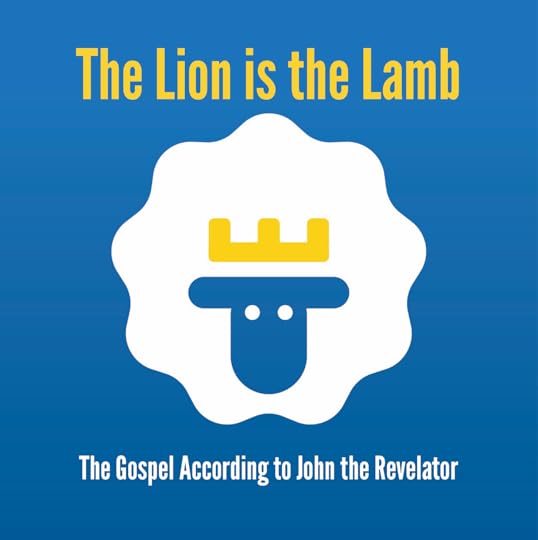
Tamed Cynic is a reader-supported publication. To receive new posts and all content, consider becoming a paid subscriber.
Revelation 13.1-10
There is an odd, oft-neglected story in the Old Testament. Faced with the responsibilities of his rule, King David flinches at the Lord’s summons to trust God and God alone for Israel’s well-being. As his friend Jonathon reminds David, “Nothing can hinder the Lord from saving by many or by few.” The former underdog opponent of Goliath should not require such a reminder. Nevertheless, “In God We Trust” may make for a self-justifying sentiment on a dollar bill, but it makes for an impractical governing platform.
Or so King David concludes.
Seeing the vulnerability of the Lord’s chosen nation, with enemies frequently marshaling at their borders, David decides that his kingdom will conduct a census. David sought to take a census of his people; so that, he could raise a proportionate army and thereby protect the nation. But, once again, protecting the nation was not David’s burden to bear, “Is the Lord not powerful enough to protect us?” Interestingly, God’s word attributes this census policy to God’s Enemy. The first verse of 1 Chronicles reports, “Satan stood up against Israel, and incited David to count the people of Israel.”
Satan incited David to count the people.
To reduce those whom the Lord names to numbers is beastly.To reduce names in the Lord’s Book of Life to numbers in a machine, for the purpose of living in the world as though there is not God— that’s what David was doing— is the manifestation of God’s Enemy.
A census!
An ordinary, everyday, real world practicality.
And yet, 1 Chronicles 21 is the only passage in all of Israel’s scriptures to give the devil a personal name, Satan.
The name appears again at the start of the New Testament. In the Gospel According to Matthew, immediately after John baptizes Jesus in the Jordan River, the Holy Spirit flings the Son into the wilderness in order to be tempted by the Dragon.
Satan confronts Jesus with three ostensible goods:
Feed the hungry— turn these stones to bread.
Lift up the lowly— perform spectacular spiritual feats and confirm the downtrodden’s hope that there is God.
Change the world— take control of the governments of the world.
In his own account of the temptation, Luke writes that having failed to woo the Son of God, Satan departed him “until a more opportune time.”
Do not fail to notice.
Satan may disappear from Jesus in the desert but Satan’s sovereignty over the kingdoms of this world does not likewise disappear.
The devil offers Jesus the governments of this age as though they are his possessions to gift.And, having failed to entice Jesus with them, the devil departs with them still very much in his grip.
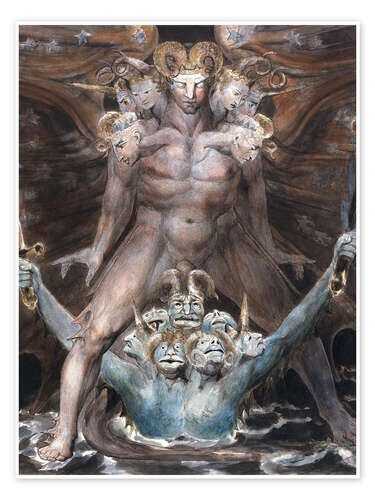
“And authority was given to the beast over every tribe and people and language and nation, and all who dwell on earth will worship it.”
In the gloaming hours of a cold Thursday in February 2022, Marcos Cux, who had only recently been thirteen years old, put on his green rubber overalls and matching jacket, a pair of steel-toed rubber boots, and two pairs of chemical gloves, and left for his cleaning shift at the Perdue slaughterhouse in Accomac County on the Eastern Shore of Virginia.
Every night there is much debris and detritus; the Perdue plant processes over a million chickens every week. Marcos and his team, almost all children, were tasked with sanitizing the slaughterhouse by five in the morning, just before the day’s shipment of chickens in steel cages arrived. Some of the children who worked with Marcos had welts on their bodies that would last for months, burns where the cleaning agents had found tears in their hand-me-down protective equipment.
From a small village in Guatemala, Marcos lives in the Dreamland Trailer Park with his cousin Antonio and her four children. Unable to provide for their son, Marcos’s parents borrowed against their farmland to pay a coyote to bring their son to America. After the the Department of Health and Human Services connected Marcos with his cousin, Marcos borrowed a thousand dollars from her to buy fake papers from a fellow middle school classmate so that he could land a job with the overnight cleaning crew at Perdue. The work paid more than minimum wage, money Marcos wired to his parents back home.
One night in February, just after his fourteenth birthday, Marcos found a piece of torn rubber glove stuck in the conveyor belt of the deboning area. Just as he reached inside to pry it loose, another worker, not seeing Marcos, turned on the machine. Marcos recalled to a reporter that his blood loss was so rapid he did not feel any pain— he was losing consciousness— but that he knew from the alarmed faces that gathered over him that his maiming was very bad.
According to the story in the NY Times:
A supervisor called 911 to report the injury. “We don’t know what to do,” she said, her voice rising. “It’s bleeding out.” The dispatcher ran through a list of questions about his condition. “And how old is that person?” the dispatcher asked.
The supervisor did not respond.
“Even if you had to guess?” he asked.
Still no response.
“Like, 20s? 30s?” he asked.
“Um,” the supervisor said, her voice shaking.
Another moment passed, and the line went dead.”
The Times paints a harrowing picture of the layers of greed and self-interest, fear and indifference, that allow for a child like Marcos to be a mere statistic in a workplace safety report. Perdue, for instance, once sanitized their slaughterhouses themselves but several years ago began contracting with third party cleaning companies to shield themselves from child labor liability. “If companies like this looked too closely at who was working,” one worker told the journalist, “no company would be able to keep going.”
The Department of Health and Human Services never once checked up with Antonia about Marcos, as they had pledged they would, after they placed him in her trailer. A local police officer spoke to Marcos’s teacher about his injury but did not otherwise investigate the incident, saying it was “not a law enforcement matter.” Marcos’s teacher meanwhile admitted to the reporter that she lets her exhausted students sleep in her class, justifying her decision by positing that such students are never going to need to know algebra and trigonometry in any case. Maria Escalante, a U.S.D.A. inspector, confessed that she sees children at the plants she visits and feels bad about the situation. “But,” she insisted, “It’s not my place to say anything.” The following morning local residents whispered about Marcos’s injury but no one spoke up about it or filed a complaint. “There were reasons that supervisors, teachers, federal inspectors and even police officers had said nothing for years about children working at the slaughterhouses…” the NY Times story notes, “If the plants shut down because of a labor scandal, the local economy could collapse.”
The call from the slaughterhouse to the emergency dispatcher that night triggered an alert to the Occupational Safety and Health Administration. Federal officials passed the information to Virginia’s state office to investigate. The state compliance officer instead invited the company to conduct their own investigation. After Marcos’s near fatality, night-shift workers worried their bosses would start firing children but, the Times notes, “the plant kept running more or less as it had been.” The only change was that supervisors stopped letting students leave early to catch the school bus, which struck them as a tacit admission the slaughterhouse was filled with minors.
The author of the Times piece, Hannah Dreier, reports that when Perdue officials got wind of her investigation slaughterhouses around the country began passing out fliers with her photograph, her picture was accompanied by a warning to their employees to keep quiet. As an additional warning, all those who spoke to Hannah Dreier for her story were fired. As a carrot instead of a stick, the company subsequently built an addition to the local library and donated funds to the local government, fire and police.
Surgeons managed to salvage the boy’s arm. After two operations and six months, Marcos is a “rarity” in that rural town; that is, he’s a child who does not work. That he is such a rare statistic is not surprising considering the fact the Department of Labor employs less than a thousand inspectors for over eleven million workplaces.
Given the numbers, a child like Marcos could never not be a mere number.
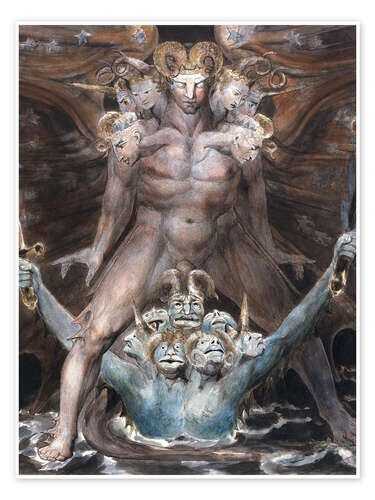
“And I saw a beast rising out of the sea, having ten horns and seven heads…And the dragon gave it his power and his throne and great authority…In amazement the whole earth followed the beast, saying, ‘Who is like the beast, and who can fight against it?’”
The arresting, prophetic imagery aside, here in the Apocalypse, the Seer sees, simply, nothing other than what 1 Chronicles and the Wilderness Temptation have already shown to us.
The Book of Revelation is bizarre and kaleidoscopic in its visual mode but it is a profound mistake to suppose that its message is otherworldly.Elaborating upon the Book of Daniel, Revelation 13 documents the second phase of the Dragon’s work in the world. As Satan cannot prevail against either the Son or the Mother of God, he wages war upon her offspring. The devil wages this conflict against Christ’s body by wielding dominion over the world— its kingdoms and systems and institutions— in which the church finds herself.
Straightforwardly, this is what John is given to see.
And so, John reports, the Dragon summons an ally out of the depths. The Dragon beholds his image reflected in the sea— the biblical symbol for chaos and evil— and his act of beholding mysteriously brings forth a reality of its own, the Beast.
Where the prophet Daniel was shown four beasts, representing the Babylonians, the Medes, the Parthians, and the Greeks respectively, the Spirit of Jesus shows John a single beast who bears all the attributes of Daniel’s four. In the Book of Daniel, the prophet makes the allegory transparent. The four beasts are the four kingdoms that have oppressed God’s chosen people. The ten horns on the fourth beast are the ten kings which followed Alexander the Great and the little horn is the last king, Antiochus Epiphanes, the villain at the close of Israel’s scriptures who profaned God’s temple in Jerusalem.
The single beast of Revelation is both the Roman Empire and also every empire. More importantly, the single beast is the final beast, not merely in the sense of being last in a series but in the sense of disclosing our penultimate reality: a world willingly enslaved to a power that is not God.This is why Revelation’s Beast is all of Daniel’s beasts rolled into one.
The Beast is not Satan but corresponds to Satan; they’re spiritual equivalents. Thus, both have seven heads and ten horns and both wear crowns. William Blake’s unsettling watercolor of this passage, entitled The Great Red Dragon and the Beast from the Sea, displays the Beast rising up out of the depths into the space between the Dragon’s legs, parodying Mary giving birth to God. The parody extends further in the text. The prophet John refers to Christ in verse four with the Greek word arnion and refers to the Beast with the Greek work therion. The words rhyme. Even at the aural level “the Beast mimics the one he despises.”
Though the term never appears in the Apocalypse, the Beast is antichrist, the Lord Jesus’s opposite, who holds the principalities and powers of this world in his grip.
Just in case there’s any doubt his vision puts us in the realm of the political, the prophet John repeats the word authority (political authority) five times in just ten verses.
The prophet sees those who dwell on the earth offering themselves to the Beast’s service exactly because the Beast’s way in the world appears destined to win out in the end, “Who is like the beast, and who can fight against it?” Or put differently, “If companies like this looked too closely at who was working, no company would be able to keep going.”
Perhaps even more troubling, John is given to see that the Beast is allowed to make war on Christ’s body and even, in this penultimate reality, to conquer it.
The saints lose.It’s not simply an uphill battle.Short of the End, we wage a losing campaign.As Stanley Hauerwas insists repeatedly:
Christianity is not a strategy to make the world come out right.
Our only hope, the Spirit of Jesus shows John, is that we not worship and serve that which we cannot defeat. The baptized, John sees in verse eight, those “whose names have been written in the Book of Life…” will not worship the Beast.
Christ’s body will not beat the Beast.
But neither will his body bow down to the Beast.
We will abide in the way of the Lamb— that’s the promise; that’s the hope.
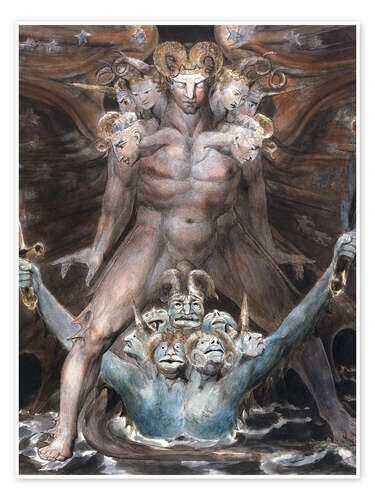
Hearing about his injury at the slaughterhouse, a school counselor called Marcos’s guardian, Antonia, to inquire about him but Antonia told the counselor that Marcos had fallen at home. “I was nervous to say anything more because of his age,” she said.
The one place Antonia and the other residents of the Dreamland Trailer Park felt free to speak the truth of their plight, to share about the desperate situations that led them to flee their countries for different, desperate situations, was the local Catholic church. Kneeling on the floor in front of the sanctuary’s metal folding chairs, the gathered believers spoke about Marcos and the other maimed and injured children they had known. They freely discussed an industry that turns a blind eye to them, consumers indifferent to them, and a government complicit in it all.
The church’s priest invited them to share their stories.
And then he announced an offering and a Mass for Marcos.
“What I can do,” he said to the reporter, “What we can do right now is bear witness.”
Bear witness against the Beast.
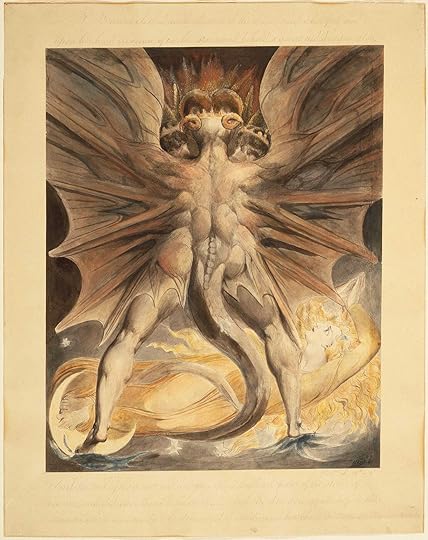
Here in Revelation 13, the Spirit unveils a reality even more mysterious and perplexing than the Beast’s dominion over the Lord’s earth. Namely, the Spirit shows John the “Lamb slain from before the foundation of the world.”
Don’t rush past the claim buried in this brief verse:“The Lamb slain from before the foundation of the world.”Not only is there no Lamb who is not slain, there has never not been a Lamb who is slain. Put differently, there is no second person of the Trinity in abstraction. There is no Logos who is not already Mary’s boy. There is no only begotten Son who is not always the hanged man of Golgotha.
As the church father Irenaeus puts it in his treatment of Revelation:
Christ crucified is his own presupposition in God’s eternity.
That is—
It’s not simply that our penultimate reality is one where the kingdoms of this world belong to the devil’s Beast. It’s that the crucifixion is God’s penultimate Good.That the Lamb is slain from before the foundation of the world means that God’s work of creation is for his work of redemption.
Irenaeus again:
“Since the Savior was preexistent, it was necessary that what was to be saved came to be, lest the Savior be pointless.”
Or, as Karl Barth echoed the same point, Christ’s death and resurrection for sinners is not to be construed as a:
“wretched expedient…in view of the failure of a plan…that had originally a different intention and form…on the contrary, creation is to prepare the sphere in which the institution and history of the covenant takes place…and the content of this eternal covenant is Jesus Christ just as he appears in the Gospels. God’s eternal decision is made exactly as it is fulfilled and revealed in time. Indeed when God declares his creation good, it is in view of both sides of its destiny, its glorious salvation and the sin from which it needs saving.”
I realize that was a long quote to read, but I think citation of others from the communion of saints is critical because this is a claim you’re liable to dismiss as preposterous when, in fact, it’s simply creedal Christianity.
For instance, Barth merely elaborates the Exultet the church sings during the Easter vigil, “O Happy Fault that merited such and so great a Redeemer!”
The Lamb slain from before the foundation of the world.
In other words—
God creates the world.So that, God may suffer and die for it.This is more mysterious than red dragons and seven-headed beasts. Consider, if crucifixion is God’s penultimate Good and if crucifixion is for sin, then, as inconceivable as it might be to us, the sin and fallenness of creation are likewise an intermediate good.
As Robert Jenson writes, paraphrasing Thomas Aquinas:
“It is a corollary of the doctrine of justification that whatever happens happens within the will of God…the notion could never occur to any biblical writer that an event or aspect of history could be outside the Lord’s control.”
That God creates not just the world but the very history in need of redemption sounds shocking to us perhaps but then again it’s the straightforward claim in verse seven of this chapter, “And the Beast was allowed to make war on the saints and to conquer them.”
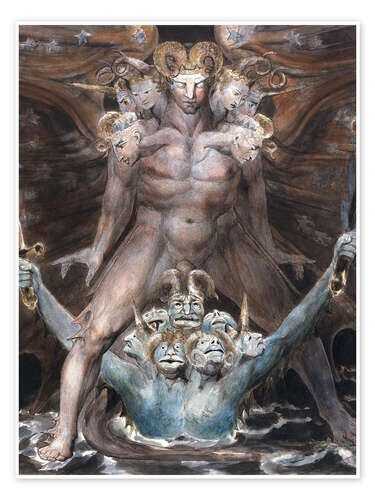
The NY Times article ends by noting that Marcos is fifteen years old now and he will never again wear short-sleeves. Today he works at a Tysons slaughterhouse.
Whatever happens happens within the will of God.
“This corollary,” Robert Jenson admits candidly, “along with the observation of what actually happens [in history] may drive you to unbelief.”
To follow this Lamb in faith is to accept the contradictions of historical experience as definitive short of the Fulfillment.The history God makes with us may drive you to unbelief, yet the same history does not stop Antonia and Marcos from kneeling— their hands out, their mouths open— to receive this God in bread and wine.
Faith JUST IS the reality that reality may defeat faith.“But,” Jenson writes, “if our faith is so sustained by the proclamation of Christ’s crucifixion that it can live in such testing, then no part of human life and the world can then be indifferent for it.”
If our faith is not defeated, our faith cannot be indifferent.
Jenson means—
If the crucifixion is a penultimate good for the purpose of redemption, then the Future, where Jesus now lives with death behind him, should determine how we see and act in the present.
In other words, because the Lamb is slain from before the foundation of the world, Christians should give a damn about the world.
We should bear witness against the Beast.
We should bear witness even if the Lamb alone can beat the Beast.
To take that out of the register of prophecy and make it plain:Apolitical Christianity is mere unbelief; the god of such a “Christianity” is not the God of the Gospels.To think—
Just the day before I read Marcos’s name in the Times article, I grumbled at the grocery store about the price of a whole chicken.
The number on the moist, pink tag was the only thing I gave a damn about.
And, just so, I’d been caught in unbelief.
To be sure, the preexistence of the crucified Christ raises perplexing, even unsettling questions.
This is the history God is making with us?
We should seek comfort in what is, in fact, more central to the New Testament— not Christ’s preexistence but his post-existence.
Jesus lives with death behind him.
And from that future, one day all sad things will be made untrue.
And because the King and the Kingdom are one, following Jesus and standing at the doors of this future are the same.
Following Jesus and standing at the doors of the Last Future are equivalent.
Therefore—
Though the Beast may yet rule this present evil age, though you may feel his dominion in the struggles and compromises of your everyday present life, the Last Future draws near every time we follow Jesus’s command, “Take and eat, this is my body broken for you.”
 Get more from Jason Micheli in the Substack appAvailable for iOS and AndroidGet the app
Get more from Jason Micheli in the Substack appAvailable for iOS and AndroidGet the app
September 23, 2023
Apolitical Christianity is Pure Delusion
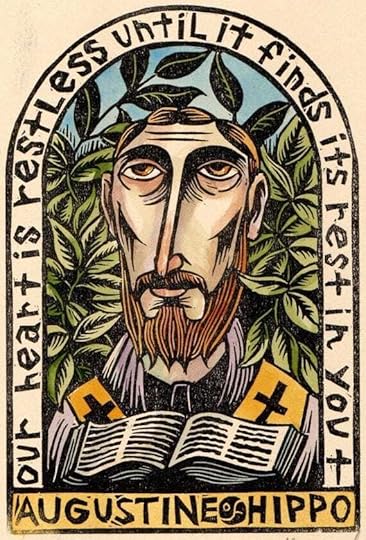
Tamed Cynic is a reader-supported publication. To receive new posts and all content, consider becoming a paid subscriber.
First:
I am leading the monthly book club for Mockingbird tomorrow at 3:00. We will be discussing Robert Jenson’s little book, A Theology in Outline:Can These Bones Live?
Here is the information:
Zoom info:
Meeting ID: 871 9451 4029 / Passcode: 519867
Invite Link: https://us06web.zoom.us/j/87194514029?pwd=NVV4MVRwMmhZeWgxWEF4RldHMjJaUT09
Speaking of Jenson…
In my parish, I am in the midst of a lectio continua series through the Apocalypse to John. As Karl Barth famously insisted in his Römerbrief, Christianity that is not entirely and altogether eschatology [proclamation of the End] has entirely and altogether nothing to do with Christianity.”
It is exactly Christianity’s apocalyptic character, its preoccupation with the End, that makes Christianity, like Judaism before it, inherently political. Consideration of the City of God and how we shall live in the Fulfillment necessarily bear upon how we live now in the Earthly City. Because to follow Jesus is to stand at the Kingdom’s gate, labor for the public good and service for the neighbor just are a glory to God. However, our common life now is only possible if gathered around a common good, St. Augustine argues in City of God.
As God is the only ultimate good common to us all, any polity premised on any other lesser good will fail to bind a people together. America is still too young to think herself the exception to Augustine’s rule.On these matters, I recently stumbled across an aside by the theologian Robert Jenson. Eerie for its prescience, Jenson prophesied our dehumanizing politics before I was born.
This is from 1976:
In the United States, Jefferson indeed traced the sovereignty of the people to an endowment by the “Creator,” but the Creator he had in mind was religiously quiescent, a deity whose presence or absence would make no difference to the practical conduct of affairs. Insofar as modern states appeal to deity, they appeal to a deity invented especially for the purpose of not interfering. The God who would make a difference to public affairs is explicitly banished from them by the found ideologies of modern states. Thus James Madison insisted on religious freedom in order to “multiply sects,” the purpose of the multiplication being so to balance them against each other that none could achieve public influence…
In all Western secular states, the expulsion of faith from the political realm is gradually destroying faith. Expelled from the arena in which we make shared choices, faith becomes a “private matter.” But the “private” in this sense shrinks to a dimensionless point; for once the individual is set against the community, the individual loses reality. The individual’s religion loses application to actual life, which is live in communication and community.
Thus American Protestantism once dreamed of the American commonwealth as a new Zion prepared for the returning Christ. Then Protestantism abandoned the commonwealth itself to the inactive Creator of Jefferson and Madison, and the collapse to the dimensionless point began. First Protestantism set out to create, instead of a holy state, a holy people for the Lord within the state; the great movements of reform and revival in nineteenth century American Christianity are the successive waves of this effort. Then, around the turn of the century, Protestantism abandoned the attempt to convert the people, and limited itself to “saving” enough individuals to make a holy leaven among the people. Now, finally, it is accepted doctrine that religion is “private,” that for communal purposes it does not matter what I believe so long as I believe something. As is manifest to all observation, this “private” religion is precisely religion which can be counted on not interfere with any actual action or communication of its possessor, all of which are necessarily in some fashion public.
This religion is pure delusion.
Just as the separation of religion and politics is bringing modern Western communities to religious deprivation, so it is bringing them to political dehumanization.
Now that Jefferson’s “Creator” has to go it alone, his incapacity is manifest; and the moral cohesion and common purpose of the American people visibly decrease from day to day.
 Get more from Jason Micheli in the Substack appAvailable for iOS and AndroidGet the app
Get more from Jason Micheli in the Substack appAvailable for iOS and AndroidGet the app
September 22, 2023
The String Cheese Incident
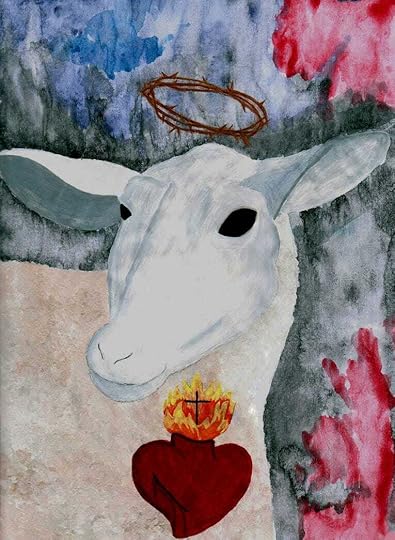
Tamed Cynic is a reader-supported publication. To receive new posts and all content, consider becoming a paid subscriber.
Some people from the podcast posse sat down for a conversation about Yom Kippur, Jonah, atonement, and repairing relationships.
We hope you enjoy the conversation.
September 21, 2023
The Gospel is Palliative Care for the Already Died
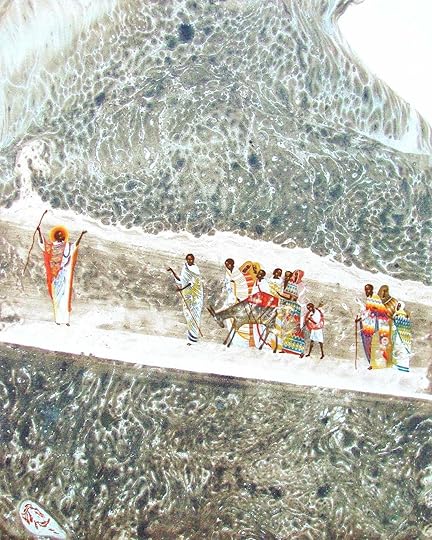
Tamed Cynic is a reader-supported publication. To receive new posts and all content, consider becoming a paid subscriber.
The Old Testament lectionary passage for this Sunday is from Exodus 16:
The whole congregation of the Israelites complained against Moses and Aaron in the wilderness. The Israelites said to them, "If only we had died by the hand of the LORD in the land of Egypt, when we sat by the fleshpots and ate our fill of bread; for you have brought us out into this wilderness to kill this whole assembly with hunger." Then the LORD said to Moses, "I am going to rain bread from heaven for you, and each day the people shall go out and gather enough for that day. In that way I will test them, whether they will follow my instruction or not. On the sixth day, when they prepare what they bring in, it will be twice as much as they gather on other days." So Moses and Aaron said to all the Israelites, "In the evening you shall know that it was the LORD who brought you out of the land of Egypt, and in the morning you shall see the glory of the LORD, because he has heard your complaining against the LORD. For what are we, that you complain against us?"And Moses said, "When the LORD gives you meat to eat in the evening and your fill of bread in the morning, because the LORD has heard the complaining that you utter against him--what are we? Your complaining is not against us but against the LORD." Then Moses said to Aaron, "Say to the whole congregation of the Israelites, 'Draw near to the LORD, for he has heard your complaining.'" And as Aaron spoke to the whole congregation of the Israelites, they looked toward the wilderness, and the glory of the LORD appeared in the cloud. The LORD spoke to Moses and said,"I have heard the complaining of the Israelites; say to them, 'At twilight you shall eat meat, and in the morning you shall have your fill of bread; then you shall know that I am the LORD your God.'" In the evening quails came up and covered the camp; and in the morning there was a layer of dew around the camp. When the layer of dew lifted, there on the surface of the wilderness was a fine flaky substance, as fine as frost on the ground. When the Israelites saw it, they said to one another, "What is it?" For they did not know what it was. Moses said to them, "It is the bread that the LORD has given you to eat”
“You’ve brought us out here to kill us!” Sure, it can sound a little ungrateful considering they’re still damp from the Red Sea through which God FREAKING DELIVERED THEM FROM CENTURIES OF SLAVERY. As soon as they get the munchies, their Bob Marley Exodus song turns Janet Jackson, “What have you done for me lately?!”
Still, ungrateful or not, it’s a fair gripe because they’re not lost. No one took a wrong turn into the desert.
It’s not Siri’s fault. From the Red Sea forward, God guided them,appearing in a pillar of cloud and fire, straight into godforsaken-ness.So, like charging extra for leg room or $12 for a Bloody Mary, their’s is a fair traveler’s complaint— they’re there because God has led them there.
And not only is it a justified complaint, it’s correct.
God has brought them there to kill them.
(You won’t hear that from Joel Osteen!)
God has brought them to the desert for the desert to be the death of them, for their hunger to be a kind of hospice in which God kills off their old selves. That they recall their bondage to Pharaoh fondly is proof that they’re not yet free. So God brings them to the desert for a different kind of deliverance. God answers their nostalgia for Egypt’s stewpots by upping the ante and providing quail every evening.
Meat generally and quail particularly were considered delicacies and according to Moses every evening at twilight this abundance of expense, quail, covered their camp. Wherever they were in the wilderness, it was there.
God responds to their petty, ungrateful griping with a gesture of unmerited extravagance. Even though they begrudge him their deliverance, God gives them the opposite of what they deserve. Every day a feathered two-part message: 1) Lose your illusions about Egypt 2) I, the Lord your God, am not a Pharaoh.“Quail covered the camp” Moses writes. Every evening, fancy 5-Star fare. And every morning, under the dew of the desert, the opposite of extravagance, manna.
Bread.
From Heaven.
Because we put the loaves on the altar table instead of smearing the dough on foreheads at Ash Wednesday, it’s easy for us to forget.
Bread, in the Bible, is not quail.It’s not food for a feast.Bread, in the Bible, is a token of the Fall. Bread is a symbol for original sin.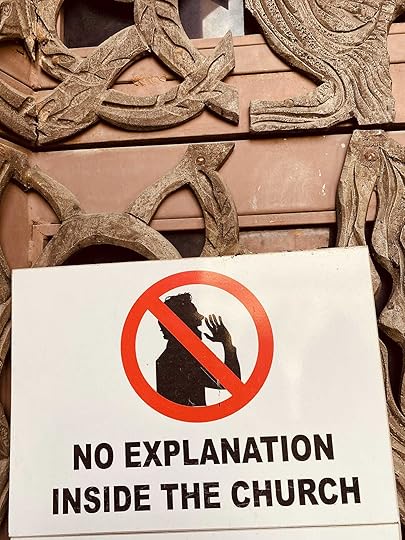
After Adam and Eve distrust God in the Garden and disobey God’s only law, God shows them the exit to Eden and God’s parting words to Adam: “Because you have disobeyed…by the sweat of your brow, you shall eat bread until you die, for you are dust and to dust you shall return.”
Before the Fall, Adam and Eve ate the nuts and fruit of the Garden. After the Fall, bread becomes a kind of sacrament to their estrangement from the Garden. And it’s work that requires work: harvesting and grinding and mixing and kneading and rising and waiting and folding and rising and waiting and folding and baking. Bread is the work that marks their sin and fall from grace but now, in the Desert of Sin, God gives it to them as grace.
Their work— what should be their work, their punishment, the wages of their sin, becomes grace.And it’s all God’s work. There’s no harvesting or grinding or mixing or kneading or rising or waiting or folding or rising or waiting or folding or baking. There’s nothing for them to do but receive it.
Every morning, what had been their work to perform is God’s grace to provide.
Not on any morning is there anything for them to do except trust that wherever they are, whoever they are, and whatever they have done, it will be there and it will be enough. God takes their work and God makes it grace because God has rescued them from Egypt in order to return them to Eden. God has delivered them from the despot Pharaoh and delivered them into the Desert of Sin in order to undo their original sin.
Our original, originating sin- it wasn’t disobedience. It wasn’t picking the fruit of the tree in the garden. That would be a stupid story. Our original, originating sin wasn’t disobedience; it was disbelief.
“Did God really say…?”
Our original sin was unbelief, not our failure to obey God’s law but our failure to trust God’s promise, to trust God’s promise that avoiding the tree in the garden was for our good. And so in the Desert of Sin, every morning God gives them manna according to his promise. The work that had been theirs to do becomes God’s work alone. The symbol of their unfaithfulness becomes a sign of God’s faithfulness. And God gives it to them as grace. There’s nothing for them to do but trust God’s doing. Anything other than trust alone in the doing of God and the manna molds, the bread of heaven breeds worms.
From dirt you came and to dirt you will return.
Whether they knew or not— the grumblers were absolutely right. God has brought them there to kill them, to exterminate the old, untrusting Adam in them. God has gotten them out of Egypt and now, in the Desert of Sin, God is getting the Egypt out of them.
Because it’s slaves who ask “What must I do?”It’s slaves who ask “What do I have to do now? What should I being doing, Lord?”But it’s children who trust their Father to do everything for them.It’s slaves who ask “What must I do?” It’s children who trust their Father’s promise that it is done. It’s children who trust the eldest Brother when he says “It is finished.”
They might be cranky with the munchies and ungrateful as all get out, but the Israelites— they’re right. God has led them there to Sin to kill them.
Nude faith, faith clothed only in the grace of God, trusting that there’s nothing for us to do but believe and receive, for those of us whose self-image is so determined by what we do, faith alone in the grace of God alone— don’t lie— it isn’t just offensive; it feels like dying.
In the Gospel according to John, no sooner as Jesus fed a hungry crowd of 5,000 with only 5 loaves of bread and 2 fish than some grumblers in the mob start to measure this Messiah’s manna-hood.
“5 loaves and 2 fish…that’s a nifty trick, Jesus. Good for you! Now Moses…he was something else. Moses fed all of Israel every morning with manna for 40 years.”
And Jesus replies (in my Southern paraphrase edition), “Bless your heart.”
No, Jesus replies: Moses isn’t the One who gave you manna. I AM the Bread of Life. I AM the Bread of Heaven, Living Bread. Manna is me, come down for you. Whoever eats my flesh and drinks my blood will have eternal life and whoever does not will not. Those who ate manna in the Desert of Sin, Jesus points out, still died of sin. So Jesus warns them: “Do not work for the food that perishes but for the food that endures for eternal life.”
Do not work for the food that perishes.
And what comes next in the Gospel according to John, it’s only 2 verses, it’s just 30 Greek words, but it’s everything.It’s the sum of St. Paul’s message. It’s the core of the Protestant Reformation. It’s only 2 verses, just 30 Greek words, but it’s everything. It’s the Gospel.
First, they ask Jesus a question. They ask Jesus the question, the question that captives like us are always asking: “What must we do?” “What should we be doing so that we are doing the works of God?” Should we…and you’ve asked the question enough yourself that you can fill in the blank for them. Should we pray more? Should we study the scriptures more? Should we serve the poor more? Spend less at Christmas? “What should we be doing so that we are doing the works of God?”
And Jesus answers by correcting the grammar of their question. He changes the
subject of their sentence, from us to God: “This is the work of God…” What we think is our work, our burden and obligation, to get right with God, to be reckoned to the good, to be justified before God- it’s the work of God. That’s not a ‘we’ kind of question, Jesus says. It’s a God question.
Jesus doesn’t just change the subject of their sentence. He changes the object of their sentence too. We put the question in the plural: “What should I be doing to be doing the works of God?” What stuff should we be doing? How much do we have to do?
But Jesus answers in the singular: “This the doing of God that you trust the One sent by God.”There isn’t any stuff we have to do. We do not have to do several things, or even one good thing, to be justified before God. There is only 1 thing to do, 1 work: your trust.
Like manna under the desert dew, all you have to do is believe and receive.Trust.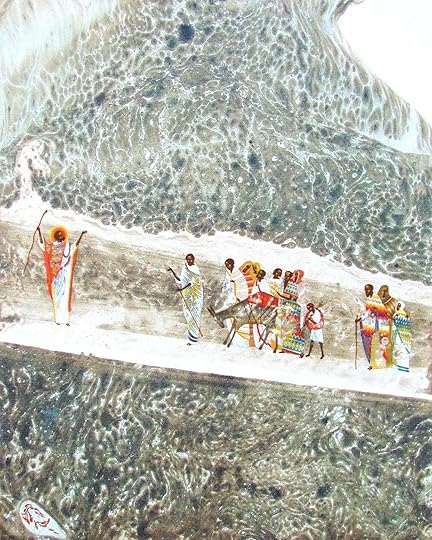
All you have to do is trust that it’s all already been done. All you have to do is trust what he has done. Jesus Christ, this manna made flesh, has finished what the Father started in the Desert of Sin. He’s killed off the Old Adam in you, once for all, by drowning him in the baptism of his death and resurrection. The old untrusting Adam in you has been crucified in him; so that, now, in him, in the New Adam, (present-tense, no conditions or qualifiers) you are a New Creation.
Where bread was given to the Old Adam as a sign of sin and punishment, this New Adam, the Living Bread of Heaven, has taken on all your sins and suffered punishment in your place; so that, the curse you deserve would become the blessing you do not.
Don’t just do something, Jesus all but answers, stand there.Stand still— all you have to do is believe and receive. Trust. Like manna in the morning, there’s nothing left for you to do but eat. Eat this promise.
Trust.
Trust that you are the pearl of great price that the King has bought by giving away everything. Trust that you are the prodigal child for whom the Father did not wait to come home to him but has sought you out in his only Son.
All you have to do is trust the doing of God.
Trust that God made him to be sin who knew no sin; so that, you might become the righteousness of God. Trust that you who were dead to your trespasses have been made alive in Christ. Trust that your slate is wiped clean because your sins have been washed in the blood of the lamb.
All you have to do is trust.
Trust that in all the ways and places you’ve been unfaithful, your manna molding, he has been faithful. He has done what you could never do. He alone is righteous and by grace alone God reckons his righteousness to you. He credits your account with Christ, such that there’s nothing left to do but trust that it’s all been done. Faith alone- that’s all there is for you to do because the righteousness of Christ imputed to you is already overflowing.
Faith alone is the only work you must do.
And it’s not even your work to do because, notice, Jesus changes the verb of their question: “What should we be doing…?” they ask.
And Jesus responds: “This is the doing of God…”
This is the doing of God that you trust the One sent by God. It’s God’s work. The one and only work we must do, God does in us: trust.
God works our faith in us.The one work we must do to respond to what God has done in Jesus Christ, Godalso does in us. It’s just 2 verses in John’s Gospel: 6.28 and 6.29. It’s just 30 Greek words in John’s Gospel, but it’s the Gospel: you are saved by God’s grace alone by Christ, Living Bread of Heaven, alone through faith alone.
It’s only 2 verses, 30 words, but it’s enough to puncture the competing impulse within us.
We think that Jesus came down from Heaven, cancelled out our debts upon the cross, but now it’s on us to work our way up to God. The Golden Rule may not justify us before God but we sure think it makes a good ladder up to him. And we’re forever anxious that we need to climb it.
The Book of Exodus says that way of thinking— it breeds worms.Martin Luther says its the Law that lures us into that way of thinking, that it turns the Gospel into the Law by making God’s grace transactional. Trust the work of God so that you may work your way up to God.
The work of the Gospel is to unburden you from the crushing weight of expectations.
The Gospel is that you are saved by God’s grace alone by Christ’s atoning blood alone and that is yours through faith- trust- alone.
The Gospel is like palliative medicine for the already died.The Gospel is that you are forgiven and justified and loved exactly as you are…FULL STOP.The work of the Gospel is to unburden you of the crushing weight of that question, “What must I be doing to be doing the works of God?”
The Gospel unburdens you to ask a different question, a question that leads to something more miraculous and even more beautiful:
What are you going to do with this faith of yours now you have the freedom not to do anything?
September 20, 2023
The God-ness of God
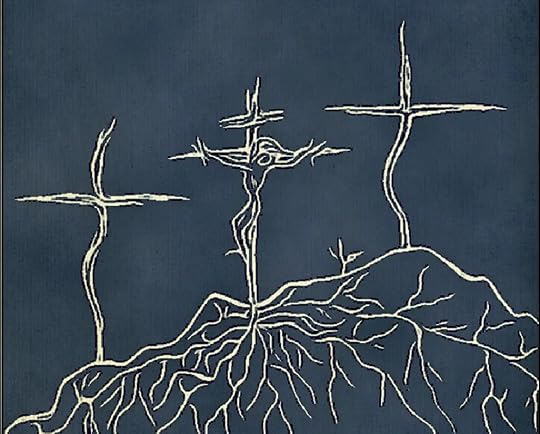
Tamed Cynic is a reader-supported publication. To receive new posts and all content, consider becoming a paid subscriber.
The lectionary epistle reading for this Sunday is Philippians 1.21-30:
For to me, living is Christ and dying is gain. If I am to live in the flesh, that means fruitful labor for me; and I do not know which I prefer. I am hard pressed between the two: my desire is to depart and be with Christ, for that is far better; but to remain in the flesh is more necessary for you. Since I am convinced of this, I know that I will remain and continue with all of you for your progress and joy in faith, so that I may share abundantly in your boasting in Christ Jesus when I come to you again. Only, live your life in a manner worthy of the gospel of Christ, so that, whether I come and see you or am absent and hear about you, I will know that you are standing firm in one spirit, striving side by side with one mind for the faith of the gospel, and are in no way intimidated by your opponents. For them this is evidence of their destruction, but of your salvation. And this is God's doing. For he has graciously granted you the privilege not only of believing in Christ, but of suffering for him as well-- since you are having the same struggle that you saw I had and now hear that I still have.
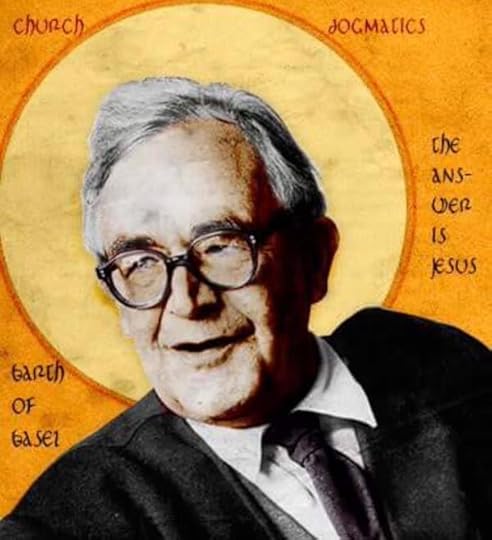
In his lectures on Philippians, Karl Barth posits that Paul’s surprising and memorable declaration in verse twenty-one (“For to me, living is Christ and dying is gain.”) should be understood alongside God’s self-revelation to Job. What Paul attests from his cell should be heard in conjunction with how Job responds to God’s address from the whirlwind.
“I had heard of you by the hearing of the ear, but now my eye sees you; therefore I despise my words, and repent in dust and ashes.”
Job says and says no more.
September 19, 2023
The God of the Bible is a Desperate Lover
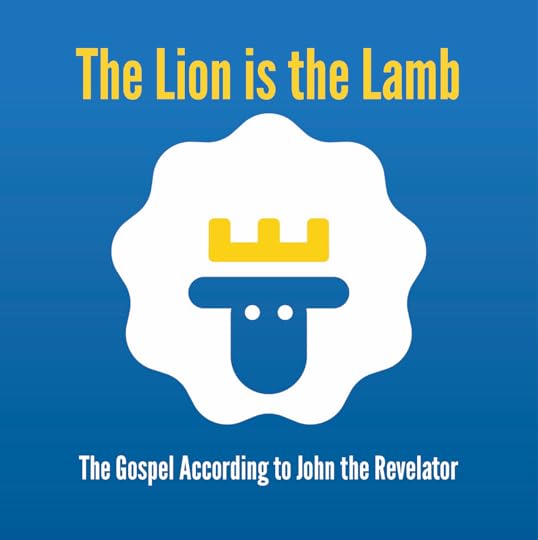
Tamed Cynic is a reader-supported publication. To receive new posts and all content, consider becoming a paid subscriber.
Hi Folks,
Here is last night’s session of our online romp through the Apocalypse. We discussed Revelation 6 and 7 last night.
Apologies to anyone for whom the new platform caused technical headaches (Remember when Zoom seemed new and alien?).
In case you missed my email this weekend, here is the link for next Monday’s session. You can simply copy and paste it into your browser:
https://riverside.fm/studio/s-studio-x9lgJIf you have any questions, let us know.
Finally, one of the nifty features of Riverside is that it automatically generates a transcription of the class. While it would be much too long to post here, I’m happy to send it along to anyone for whom hearing might be a challenge.
Peace,
Jason
September 18, 2023
Every Last Loser
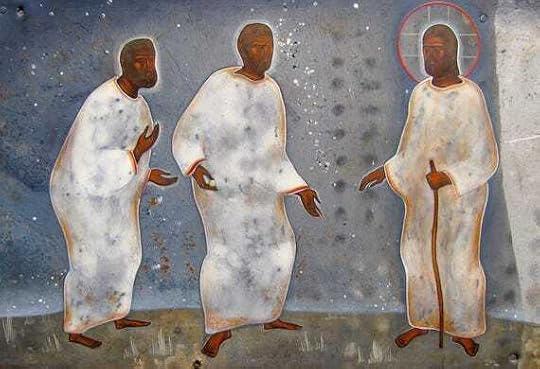
Tamed Cynic is a reader-supported publication. To receive new posts and all content, consider becoming a paid subscriber.
The lectionary gospel text this Sunday is Jesus’s parable of the laborers in the vineyard.
But before you turn to Matthew 20:1-16, check out this parable. Jesus would’ve known it. It was taught by the ancient rabbis before getting recorded and canonized in the Jewish Talmud.
A king had a vineyard for which he engaged many laborers, one of whom was especially apt and skillful. What did the king do? He took his laborer from his work, and walked through the garden conversing with him.
When the laborers came for their wage in the evening, the skillful laborer also appeared among them and received a full day’s wage from the king. The other laborers were angry at this and said, “We have toiled all day long while this man has worked but two hours; why does the king give him the full wage even as to us?”
The king said to them: “Why are you angry? Through his skill he has produced more in two hours than all of you have done all the day long.
Notice—
In the Jewish Talmudic parable, the emphasis falls on the exceptional worker’s economic productivity.But in Jesus’s remix of the parable, the stress is not on the laborer but on the landowner.The focus is not on the worker’s activity but the owner’s activity, going out, again and again, seeking and summoning. The focus isn’t on the laborer’s contributions but on the landowner’s character, “Are you envious because I am generous?”
Actually, in Matthew’s Greek, the landowner asks the grumbling laborers, “Is your eye evil because I am good?”
Because I am good—that’s the money line; that’s the clue.September 17, 2023
A Womb More Spacious Than the Stars

Tamed Cynic is a reader-supported publication. To receive new posts and all content, consider becoming a paid subscriber.
Revelation 12.1-17
In the letter my grandfather left me upon his death, he lamented I had wasted my potential “on such a trifling pursuit.”
His last words to me stung, to be sure.
Still, I’ve never had to suffer on Christ’s account. When it comes to my Christian convictions, I’ve never had to risk anything more than my embarrassment and self-image. I’ve never had to hold onto this Story at the risk of losing everything else. And I’ve known few who have.
But.
I have known a few.
Her name was Mary.
When she came to the states, she asked her friends to call her Marie. Marie’s son once sang, “Let My People Go” in my first congregation. During seminary I had several side-hustles to pay the bills because that first congregation didn’t exactly bring home the bacon. Among my side-hustles, I worked as the assistant after school director at Princeton Junior School.
Marie Garber was my supervisor.
Marie was Princeton Junior School’s librarian. Marie was also from Liberia, a coincidence of sound that confused the schoolchildren to no end, “You’re from a country called Library?" Marie had a rich, East African accent and sing-song, soulful voice. She always spoke incredibly slowly, as if she wanted to linger over every happy syllable her life gave her. And she had a laugh that began somewhere deep in her belly and always ended with her embracing in her arms whoever was nearest to her.
Marie, her husband, and their three children lived in New Jersey as refugees, having fled from Liberia not that long before I met her. Soon after the dictator Charles Taylor violently wrested control of her country, Marie and her family became his prey. Marie and her husband had been civil servants. They were just ordinary people who worked a job five days a week and on the weekends taught Sunday school at their Methodist church. When a modern day Herod imposed his power over them, Marie’s faith in a rival Lord compelled her to act. She and her husband began advocating against the Pharaoh who held them in bondage.
She seldom spoke of it. When she did so speak, it was bereft of bravado. I pulled reluctant snippets of her story from her like cotton from an aspirin bottle. Her sacrifices and the faith which motivated it and prepared her for it— she remained ever reticent to speak of it. One afternoon when the children were having a snack of animal crackers and apple slices, I asked her if she and her husband had been “political.”
“Is that what prompted you to resist?”
Marie replied with a luminous laugh, “That’s what your government called us, political refugees.”
She bit the head off of a lion and added, “But no. We were not especially political. We were just Christians.”
“I can’t imagine how frightened you must have been.”
She looked at me over the rim of her glasses, and then in the same voice she always had when she read to the children, the tone of voice that let you know the moral of the story was coming, she said, “Frightened? Perhaps. But then, there’s no need to fear when you can ask Mother Mary to pray for you.”
“Mary?” I said, surprised and a little confused, “You mean, like, Mary Mary? You asked Mary to pray for you? You don’t sound like any Methodists I know.”
She laughed again, a laugh that sounded like an open hand, a light in her eyes that seemed to warm her whole countenance.
“I don’t sound like any Methodists you know? Hmm, maybe that’s because you don’t know enough Methodists with biblical problems— you know, food and shelter, evil and oppression. Maybe you need to get to know some of Mother Mary’s children better.”
And then she stopped laughing and, like she was remembering those dark days, she said, “For those of us who have suffered the Father of Lies in this world, the train of Mother Mary’s robe is very wide, wide enough to carry us all.”
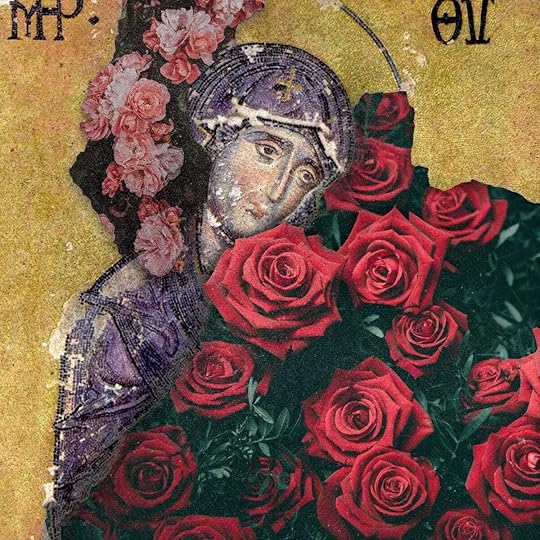
“And a great sign was seen in heaven: a woman arrayed with the sun, and the moon under her feet, and upon her head a crown of twelve stars…”
A friend of mine, Matt Milliner, teaches art history at Wheaton College. When it comes to Mary’s place in the Protestant tradition, he joked to me over Zoom:
“Imagine you’re at a party, and it’s a really great party with wonderful appetizers and delicious desserts and fantastic drinks. It’s a party with all the right people— people you love and people you want to come to love. And the party’s working. It’s all working. All of a sudden, someone bursts in from the cold, takes off their coat and says, “Hi! Hi!” And you say, “Welcome! Hello! Come in! Sit down. Have a drink. Let’s make a place for you.” And you say to one of the guests, “Get ‘em a drink! Get ‘em a drink!” But before the drink even arrives, the guest grabs a hand full of pretzels and says, “Sorry, I’ve got to be on my way now.” And just like that, the guest is gone. That’s Mary in the life of the church. We invite her inside the party long enough to grab a few pretzels before we push her back out the door.”
I laughed at Matt’s Marian analogy, but he leaned forward in his desk chair and held up to me an icon of Our Lady of the Passion. Suddenly serious, he said, “How embarrassing is it that not only do we not invite Mary to all twelve days of the Christmas party, we totally ignore that Mary— this woman— is not simply a character in a seasonal festivity. She is a pivotal protagonist throughout the story of salvation.”
Mary is a pivotal protagonist throughout the story of salvation“The dragon waxed wroth with the woman [clothed with the sun], and went away to make war with the rest of her offspring, the seed that keep the commandments of God, and hold the testimony of Jesus.”
In the Apocalypse, the seventh archangel has blown the final trump blast, and the prophet John sees projected onto the skies above him cosmic warfare, the struggle between the triune God and the Father of Lies that is the true picture of reality. Notice the dark comedy at the heart of the passage. Jesus lives with death behind him; therefore, Jesus holds the keys of death and hades. The victory of the Son of God over all the powers that are not God is already assured. The devil— symbolized by John as by Ezekiel before him as a dragon— lives on borrowed time. “He knows his time is short,” John hears all the company of heaven sing.
His pomps are waning. Already all but defeated, the devil has no power but deceit. His only recourse is “to make his way through the world as a teller of outrageous lies.” Since the devil is no match for the Son, he hunts instead the Son’s mother and the Son’s siblings. The devil’s cause may be lost and therefore futile; nonetheless, the dragon is shrewd, realizing that “if he cannot directly attack the Woman’s Son, he hurt the Son through the Mother and so he mounts an attack on her.”
Yet— again, its comic in a Wile E. Coyote kind of way— the woman proves to be maddeningly elusive prey for the dragon. With the devil in pursuit, the woman, as though she’s the prophesied supplicant from Psalm 55, is given eagle’s wings to flee from his wrath and escape into the wilderness. When the devil attempts to flood the woman from her refuge, the devil is met with a resistance that is an exodus in reverse. The ground beneath her opens and swallows up the many waters.
The earth itself responds as though she is heaven’s prized possession.
Remember, the Bible’s chapter and verse divisions are not inspired nor are they original to the scriptures. At the end of our chapter eleven, the Seer reports a vision of the ark of the covenant, but John does not otherwise describe the ark of the covenant. Then, in the very next verse— our chapter twelve— John describes the Woman Clothed with the Sun.
What John sees is the ark of the covenant.But what John describes is the Woman.She is the ark.Mary is the ark of the covenant.And make no mistake, from the time of the church fathers forward it is undisputed that the Woman Clothed with the Sun is the Theotokos, Mary the Mother of God. It’s plainly there in the descriptive details. She resembles the Son of Man that John saw in his initial vision. She is clothed with the same light that illumines his countenance. John sees the moon trampled under her feet. In scripture, the moon symbolizes “all courses and alterations of times, and what so ever is mutable and corruptible in this world, all affections also and infirmities.” In other words, that the Woman stands with the moon subdued underneath her feet, she is the Mother of him who is Alpha and Omega. The Woman Clothed with the Sun wears a crown of twelve stars, one star for every tribe and patriarch. Thus, the Woman is the Queen of Israel and, just so, the Mother of Israel’s Messiah.
But above all else, she is the ark.
As one ancient icon titles her, she is the “Container of the Uncontainable.” Or as John Donne puts it in his poem “La Corona,” she is “Thy Maker's maker, and thy Father's mother.”
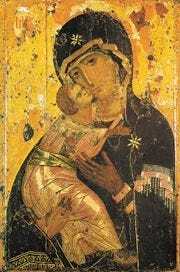
Yuri Sipko is a prominent Russian Baptist minister. In early August, Russian police raided Sipko’s home hoping to discover evidence they could use to charge him with criticizing the Russian military and posting “false information” online about the invasion of Ukraine.
Yuri Sipko was born during Stalin’s reign and grew up in Khrushchev’s Soviet Union, a period when the communist regime persecuted Christians. Recalling his formative years in Siberia, Sipko remembers:
“Baptists were considered to be one of the main enemies within the country. As children, we were discriminated against at school. We weren’t accepted to the compulsory Soviet youth organization and there was frequent bullying and threats that we would be taken away from our parents and sent to an orphanage.”
The threats were not idle. The Soviets sent Sipko’s father, also a Baptist pastor, to prison for five years on false allegations of sedition. Unlike his father before him, Yuri Sipko has thus far avoided arrest and imprisonment. When Russian police arrived at his home at Vladimir Putin’s behest, Yuri Sipko had already slipped safely out of the country. Weeks later, Sipko described his defiance in humble, matter-of-fact terms.
“The charges are based on the law that was passed immediately after the invasion,” The word ‘war’ itself was outlawed, it was banned. You could not call this operation a war. The word ‘peace’ was banned. You could not call for peace. And there were public arrests and fines and imprisonment and intimidation for any speech criticizing Russia’s actions.”
Despite the law and the charges looming over him, Sipko, who is over seventy years old, has persisted as a stubborn critic of Russia’s “criminal” invasion of Ukraine. Even after his exodus, he returned to Russia and spoke from Moscow and solicited the aid of one person in particular. Some might think it a peculiar prayer request coming from a Baptist preacher.
“We continue to pray constantly for the Lord to stop this bloodbath. We pray for God to protect Ukraine and the Ukrainian people. Lord, please stop this horrible, hateful operation. Please stop the tanks. Please stop the rockets. Please stop the cannons so that not a single more human life is being taken. Please stop them with the hands of your angels, please stop them with the hand of your Mother— the Woman Clothed with the Son.”
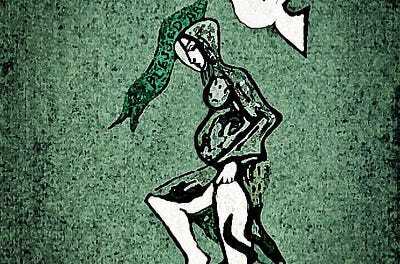
My friend Matt pointed again at his icon of the Our Lady of the Passion, an emphatic gesture which suggested If you don’t get, you don’t get it. “I say this as a Protestant Christian,” he said, “Don't dare think that somehow your conversation with Mary and your interest in her is in competition with your relationship with Christ…You are flirting with heresy if you do not have a doctrine of Mary as Mother of God. You are flirting with heresy if you do not have a starring role for Mary in your Christian faith.”
You are flirting with heresy if you do not have a starring role for Mary in your Christian faith.
And he’s absolutely right.
It was the Arian heresy in the fourth century that led to our creedal dogma. Contrary to the New Testament witness, the Arians insisted about Jesus, “There was a time when he was not.” In other words, the Son is not one substance with the Father, making Mary a mother like any other mother of a mere human.
In the history of the faith, heresy always begins by demoting Mary.But even straightforwardly in scripture, Mary does more than offer the angel her reply, “Let it be with me according to thy word.” From the cross, the Lord Jesus makes Mary the Mother of all whom he chooses to call sisters and brothers, “Behold, thy Mother.” Evidently, Mary took her son at his word because at Pentecost she gathers with his disciples in the Upper Room to await his Spirit’s arrival from the last future. And in the Apocalypse, Mary is the prophetic image for her Son’s Body and Bride, the church struggling to endure faithfully in a world ruled by the Father of Lies.
Nevertheless, even these straightforward scriptural examples do not begin to capture the mystery of the woman “whose womb is more spacious than the stars.” In 431AD, the Council of Ephesus mandated Mary’s title as Theotokos (God-bearer) an item of Christian dogma and thus condemned as heresy any understanding of Mary that flinches at professing her as the Mother God.
Simply put, if you balk at calling the Mother of Jesus the Mother of God, then you are a heretic.Theotokos.
She’s not simply the mother of Jesus’s adopted brothers and sisters. She’s a pillar of the Acts Church, but she’s not just a pillar. She’s surpassingly more mysterious than the Woman Clothed with the Sun.
She’s the Theotokos.
As the Protestant Reformer Martin Luther insisted:
“Men have crowded all her glory into a single word, Theotokos…therefore we ought to call upon her; so that, for her sake, on account of Mary, God may grant and do as we request.”
Possibly, Luther had in mind the second part of the Ave Maria, “Hail Mary, Mother of God, pray for us…."
It makes all the difference that the Ave Maria does not solicit prayers thusly, “Saint Mary, pray for us.” On the one hand, since Jesus lives with death behind him and the saints live with Jesus, invoking the prayers of Mary is no different than asking any fellow believer, living or dead, to pray for you. On the other hand, the dogma will not allow us to demote Mary to just another fellow believer.
Mary, the creeds require us to confess, is more than Saint Mary. On what basis then do Christians invoke Mary’s prayers specifically as the Mother of God?The answer is here in the Apocalypse.
The answer is here in Revelation 12— Revelation 11 and 12.
Mary is not merely Saint Mary.
Mary is the ark of the covenant.
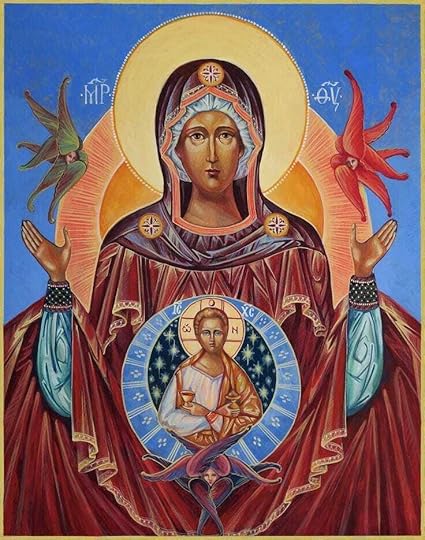
You may have seen the icons, images named the Virgin of the Sign. My friend Matthew calls them the Ultrasound Mary. The ancient images show a pregnant Mary with a small window opened onto her belly through which you can see spy the gestating God inside her.
The ancient church father, John of Damascus formulated a useful maxim the it comes to thinking about Mary:
God is his own space.
In himself, God is nothing but himself.
God is his own space. The world is another space altogether. And, by definition, the two do not overlap. But, if God is to do with his created world and if God’s creatures are to find him in this world, then God needs his own space in creation from which he can be locatable and present to his creatures.
Heaven is the Bible’s word for the space God makes for himself in his creation.Heaven is the space God makes for the sake of his creatures on earth. It’s right there in the creed, “I believe in God the Father Almighty, maker of heaven and earth.”
Just so, when Jacob awakes from his vision of a ladder traveled by angels, he erects an altar and marks the spot as “the gate of heaven.” He designates it so because it is a space in creation where the Creator may be located. But in the Bible, God’s space in creation is not simply geographic space; it’s historical space. As Robert Jenson writes, short of the End God’s heaven is the heaven of a certain nation, a particular people. “The Lord has space in his creation,” Jenson writes, “in that he dwells among a people, who as such take temporal space in creation.”
Among the people Israel, God takes space in the tabernacle and in the temple, on the lips of the prophets and over the scrolls of the torah, and in and on and around the ark of the covenant. When David danced before the ark, scripture says clearly, David danced before the Lord.
And now, John sees in the Apocalypse, Mary is this space for God. She is not one in a series, a saint among saints, not even a saint above all saints. She is absolutely singular.
The space above the temple’s cherubim throne, the space in the ark of the covenant, the space on the prophets’s lips, the space taken up the torah’s scrolls, the space in the exodus’s tent of meeting— all of it is at once (and, evidently, forever— according to John) reduced and expanded to Mary’s belly.
She is the Container of the Uncontainable.Which is to say, she is not simply the Queen of Heaven.She is it.She is not Saint Mary.She is the space scripture calls heaven.Thus, she contains not only the Uncontainable Son but all his sisters and brothers, what St. Augustine called the totus Christus. Therefore, to solicit Mary’s prayers is— what we do at the Table— to beseech the whole company of heaven; it’s to beg the church triumphant to intercede for the church on earth still struggling to endure a world ruled by the Father of Lies.

On September 11, 2001 I pulled myself away from the television set in the Princeton dining hall and I clocked in at Princeton Junior School.
The children had no notion of the day.
I found Marie alone in her library, prostrate by her desk and the Ave on her luminous lips, Hail Mary, Mother of God, pray for us. When she sensed me in the room, she looked at me over the rim of her glasses and said:
“You’re going to be a pastor some day so don’t forget. It’s quite simple Mr. Jason. If you can always remember that Mary is the Mother of God, then Jesus will never be just a once upon a time teacher. If you do not forget that Mary gave birth to God, then you will remember that history is never without hope.”
I haven’t forgotten.
But then again, Marie was not completely correct.
I have more than Mary to remember that God is not a God above history but makes it with us. Mary is not the only space heaven occupies on the earth. The altar is also an ark. As much as Mary, these creatures of bread and wine are clothed with the sun. They too contain the uncontainable. They too are more spacious than the stars.
So whatever seems hopeless in your life, come to the table.
Here, you need not even pray, “Hail Mary…”
You need only hold out your hands and say, “Thanks be to God.”
Come to the table; this is the gate of heaven.
September 16, 2023
Bonhoeffer for Troubled Times

Tamed Cynic is a reader-supported publication. To receive new posts and all content, consider becoming a paid subscriber.
I recently had a conversation with Tobias Cremer about his new book, The Godless Crusade: Religion, Populism, and Right-Wing Identity Politics in the West. (Click the link for the conversation). In it, Cremer demonstrates that the MAGA movement is not unique to America but instead represents “the Europeanization of American politics.”
With populism and performative cruelty having possessed the Republican Party and with illiberalism rising on the Left, democracy appears increasingly the fragile venture John Adams feared. Given the times, I think this series of conversations we had with our friend Dr. Jeffrey Pugh is evergreen, Bonhoeffer for Troubled Times.
My pod posse did these during the pandemic and I think they’re worth revisiting.
I’ll link them all here for ease of finding:
September 15, 2023
Grace Happens: Or, Why I Abide in Ministry
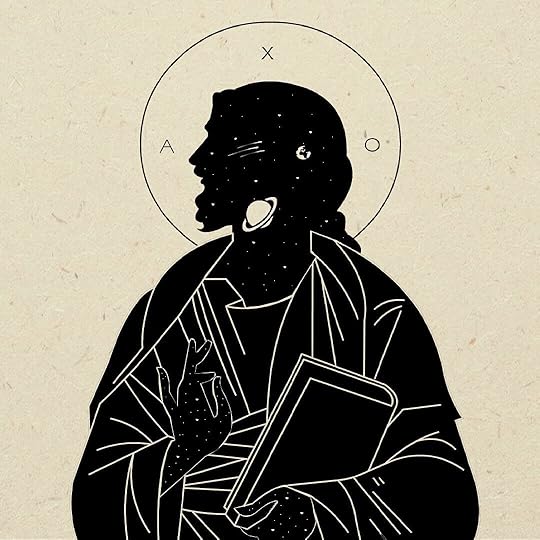
Tamed Cynic is a reader-supported publication. To receive new posts and all content, consider becoming a paid subscriber.
Recently, a letter abounded around social media. It was a missive from a minister noting the many reasons why he was leaving the ministry. The note struck a nerve, no doubt, because the soon-to-be-former-pastor was correct in many of his critiques. Too many clergy, churches, and denominations have capitulated to the demands of the market, configuring the Body’s ministry in ways that are both unmanageable and, frankly, unbiblical (i.e., Pastor as CEO/Counselor/Fundraiser/Human Resources Director).
Candidly though, I read this colleague’s epistle and I lamented how little mention he made of the gospel and its enlivening message of grace. In his characteristic bluntness, Martin Luther insists in his lectures on Galatians that only those on fire for the gospel, who are also absolutely convinced their lives have been hijacked by the Risen Christ, should ever dare preach. The call cannot be a summons vaguely felt or reluctantly followed.
Reading this letter that was making the rounds on the Christian internet, I thought of Dr. Robert Dykstra, my Jedi Master from Princeton. Just before I graduated from “Bob” lamented that I was about to serve in a denomination whose system of appointing pastors “contradicts everything we know about psychology.” I asked what he meant and he replied by explaining how it’s a given that people in congregations wear masks, keep up pretenses and are reluctant to let others see what’s behind the curtain of the self they show others.
He then offered me this wisdom:
“If you’re going to stay a Methodist, then you should tell your bishop you’ll serve wherever they send you so long as they’re willing to leave you there for at least seven years. It takes that long for people to reveal who they are behind their masks, warts and all.”
In other words, it takes time to see grace at work in people’s lives.
It takes patience to bear witness to the slow ways God works in the world.But seen it I have, and that— by a long shot and then some— is not only the best thing about ministry, it’s what keeps me at it.
The truth of the gospel is not self-evident. It requires exemplification. So, for instance, I could tell you about the woman who I knew for a decade before Jesus made her a completely different person in the last years of her life. Her name is Shirley. To be honest, our relationship back then was often marked by mutual frustration. Today, though she’s joined the company of heaven, I think of her as something of a cross between a friend and a surrogate grandmother. What accounts for the change in her? She credieds it with a spiritual discipline she started practicing a couple of years ago, intentionally praying the shema every day and daily committing herself to loving Christ and through him, others.
Grace has changed her.
Maybe that doesn’t strike you as a Road to Damascus type of story but it’s real and it’s just one example of many I could give.
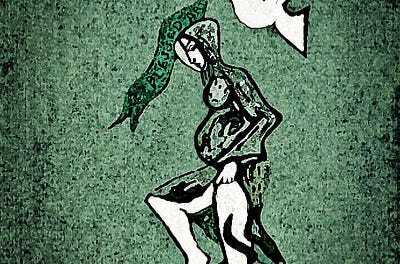
I could tell you about the woman who, having been cared for tenderly by a black nurse, at the end of her life confessed and repented of her racism.
I could tell you about husbands and wives who, after much painful work, have forgiven one another of adultery, abuse, addiction. You name it.
I could tell you about prodigals who’ve come home, mothers and fathers who’ve worked at welcoming them and elder brothers who’ve looked themselves in the mirror to finally confront the nasty self-righteousness in them.
I could tell you about people who’ve come to faith by dirtying their hands serving the poor, and I can tell you about individuals who’ve given over hundreds of thousands of dollars for the poor because God Christ has been generous to them.
I could tell you about people who’ve lost a child.
And lost their faith.
And found it again.
Even then, I’d only be scratching the surface of what I could tell you.
Not only was Dr Dykstra right. His point has turned out to be the best thing about being a pastor. If you give it time, you do get to see.
I can’t prove God exists. Any God worthy of our worship is a God who can only be known through self-revelation. And, sure, I count myself under Luther’s criteria for preachers; nevertheless, there are those dark days and dark moods— usually when the caskets are four feet long or less— when I wrestle with my doubts and fear I’ve given my life to a fool’s errand. But what I can prove, what I can point to and say “See, there it is,” what I know without ever a day of doubt, is that grace is real.
It happens.
And so I persist.
Jason Micheli's Blog
- Jason Micheli's profile
- 13 followers



